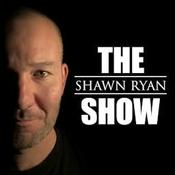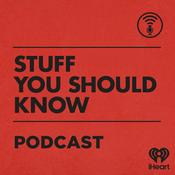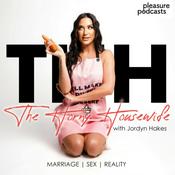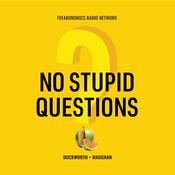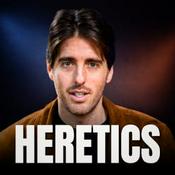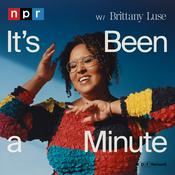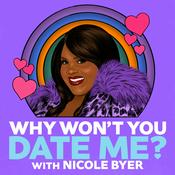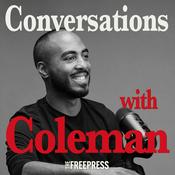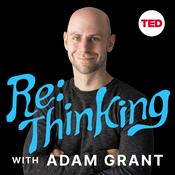80 episodes
- From the anus of TikTok comes a version of slop so wacky, so delightfully dumb, so… Italian (???), that its managed to win the hearts of every iPad kid around the world. Introducing: Italian Brainrot, the latest AI craze of anthropomorphic hybrid creatures with Italo-gibberish names and salacious lore that your littlest cousin probably filled you in on over the holidays. If you scroll through Jstor you’ll find tons of articles philosophizing such beloved stock characters as Ballerina Cappuccina, Tralalero Tralala, and Tung Tung Tung Sahur. Scholars attempting to get to the bottom of their fundamental tension: are they Dadaist works of art reacting to the chaos of these fascist times, or are they fascist in and of themselves, predetermined for cooption by right wing edge lords? In this bonus episode, Hannah and Maia discuss Italian Brainrot and ask: why children? Why Italy? And why do we kind of f*ck with Ballerina Cappuccina?
Full episode on Patreon:
https://www.patreon.com/c/rehashpodcast
Our Sponsors:
* Check out Quince: https://quince.com/REHASH
* Check out Quince: https://quince.com/REHASH
Advertising Inquiries: https://redcircle.com/brands - Born from a Japanese tech arms race and immortalized in Fred Benenson’s 2009 masterwork “Emoji Dick,” the emoji has become a staple of the way we communicate. Such that the Oxford dictionary named the cry-laugh emoji its word of the year in 2015. Whether you’d like to convey complex feelings such as “pweeeese” or embellish the end of a dry text message, it’s rare that these little symbols would not make at least one appearance in our daily text conversations. And, like most internet artifacts, early adopters of the emoji believed it had the potential to completely collapse the barriers of language and finally realize McLuhan’s predictions of a “global village.” But is that really so? In this finale episode Hannah and Maia discuss the history of the emoji and all its supposed utopian potential. Tangents include: the unasked-for details of Hannah and Maia’s long-awaited reunion, Canadian mennonite literature, and Hannah’s own personal version of the internet, the Web 1.5.
Our Sponsors:
* Check out Quince: https://quince.com/REHASH
* Check out Quince: https://quince.com/REHASH
Advertising Inquiries: https://redcircle.com/brands - Call them what you will: hactivists, cypherpunks, phone phreaks, e-bandits… these digital vigilantes may be the last bastions of hope in an Information Age where information is not dispersed equally. Growing from a group of pranksters at MIT in the 50s to the “ultra-coordinated mother-f*ckery” of Anonymous and WikiLeaks today, hactivism uses information technologies to achieve political objectives. With their hyper-sophisticated coding skills, hacktivists do everything from leaking classified documents, to providing oppressed citizenry with military grade encryption. They believe that access to computers should be total, that information should be free, and that anarchy reigns supreme. But ever since Chelsea Manning was discovered smuggling over 400k U.S military documents in a Lady Gaga CD case on behalf of WikiLeaks and governments really began cracking down on these hackers, it became clear that maybe the internet wasn’t the anarchic utopia we thought it was. Tangents include: Maia’s primal hatred of Spotify wrapped, The internet’s unfounded hatred of Geese, and Hannah’s dream of putting Maia on WikiFeet.
Support us on Patreon and get juicy bonus content:
https://www.patreon.com/rehashpodcast
Intro and outro song by our talented friend Ian Mills:
https://linktr.ee/ianmillsmusic
SOURCES:
Maya Jasanoff, “Revenge of the Quiet American,” Foreign Policy, No. 185 (March/April 2011).
Steven Levy, Hackers: Heroes of the Computer Revolution, O’Reilley (1984).
Peter Ludlow, “WikiLeaks and Hacktivist Culture,” The Nation (2010).
Ty McCormick, “Anthropology of An Idea: Hacktivism,” Foreign Policy, No. 200 (2013).
Alasdair Roberts, “The WikiLeaks Illusion,” The Wilson Quarterly, Vol. 35, No. 3 (SUMMER 2011).
Wendy H. Wong and Peter A. Brown, “E-Bandits in Global Activism: WikiLeaks, Anonymous, and the Politics of No One,” Perspectives on Politics, Vol. 11, No. 4 (December 2013).
Our Sponsors:
* Check out Quince: https://quince.com/REHASH
* Check out Quince: https://quince.com/REHASH
Advertising Inquiries: https://redcircle.com/brands - Subtweeting, or “the audible sigh of the internet,” if you will, was Twitter’s answer to WASPish passive aggression. Now, people had a platform in which they could not-so-covertly vent about those who had wronged them in as succinct a manner as possible. It was a practice exercised by the likes of Rihanna and Demi Lovato, and managed to garner its very own critics, who derided subtweeting for turning us all into indirect assholes. But was this really the case? In this episode, Hannah and Maia revisit subtweeting, as well as its spiritual ancestor, “vague booking,” to ask whether we were really as annoying as they say we were back on the internet of yore. Are publicly shading someone without naming them, or being cryptic and vague on a Wall post really just signs of society’s increasing inability to communicate, or are they an artistic release for those in need of catharsis? Tangents include, Justin Trudeau being a fame whore, Maia’s childhood obsession with Michael Jackson, and singing “Criminal” by Fiona Apple at karaoke when no one wants you to.
Support us on Patreon and get juicy bonus content:
https://www.patreon.com/rehashpodcast
Intro and outro song by our talented friend Ian Mills:
https://linktr.ee/ianmillsmusic
Our Sponsors:
* Check out Quince: https://quince.com/REHASH
* Check out Quince: https://quince.com/REHASH
Advertising Inquiries: https://redcircle.com/brands - “Oi Mista! You me dad?” …The evocative phrase heard around the world thanks to a beautiful little thing called memes. As per one definition by evolutionary biologist Richard Dawkins, the meme is a unit of cultural transmission that can be perpetuated and remixed for all eternity. These nifty visual soundbites have been around forever, but really took form in the Darwinian halls of 4chan. Evolving from image macro, to utopian “open work,” to hate symbol, to ironic shitpost where no object of consumption is sacred (not even Joan Didion… or Geese), the meme has become the true darling of our internet age. In this episode, Hannah and Maia question the purpose of the meme - is it an object of benign humour, a piece of art, a tool for bespoke branding, or a malignant “selfish” gene that has the capacity for great evil? Listen to find out. Tangents include: the Timothy vogue cover, and Hannah’s one-sided beef with Goth Shakira.
Support us on Patreon and get juicy bonus content:
https://www.patreon.com/rehashpodcast
Intro and outro song by our talented friend Ian Mills:
https://linktr.ee/ianmillsmusic
SOURCES:
Alexis Benveniste, “The Meaning and History of Memes,” The New York Times (2022).
Susan Blackmore, The Meme Machine, Oxford University Press (1999).
Roy Christopher, “The Meme is Dead, Long Live the Meme,” Post Memes: Seizing the Memes of Production, Punctum Books (2019).
Travis Diehl, “The Many, Many Heads of JD Vance,” Spike Art Magazine (2025).
Tom Gerken, “Is this 1921 cartoon the first ever meme?” BBC (2018).
Ara H. Merjian and Mike Rugnetta, “From Dada to Memes,” Art News (2020).
Scott Wark and McKenzie Wark, “Circulation and its Discontents,” Post Memes: Seizing the Memes of Production, Punctum Books (2019).
Olivia Whittick, “Feminist Meme Queen Goth Shakira,” Ssense.
Our Sponsors:
* Check out Quince: https://quince.com/REHASH
* Check out Quince: https://quince.com/REHASH
Advertising Inquiries: https://redcircle.com/brands
More Society & Culture podcasts
Trending Society & Culture podcasts
About Rehash
Rehash: The podcast about the social media phenomenons that strike a nerve in our culture, only to be quickly forgotten - but we think are due for a revisiting.
Hosted by Maia (Broey Deschanel) and Hannah Raine
Find us on Patreon: https://www.patreon.com/rehashpodcast
Podcast websiteListen to Rehash, Because We Said So and many other podcasts from around the world with the radio.net app

Get the free radio.net app
- Stations and podcasts to bookmark
- Stream via Wi-Fi or Bluetooth
- Supports Carplay & Android Auto
- Many other app features
Get the free radio.net app
- Stations and podcasts to bookmark
- Stream via Wi-Fi or Bluetooth
- Supports Carplay & Android Auto
- Many other app features


Rehash
Scan code,
download the app,
start listening.
download the app,
start listening.


